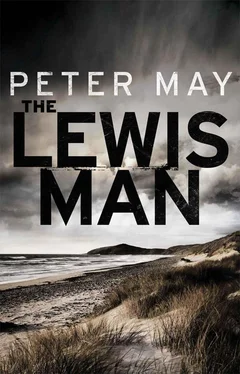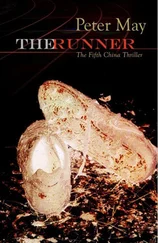Peter May - The Lewis Man
Здесь есть возможность читать онлайн «Peter May - The Lewis Man» весь текст электронной книги совершенно бесплатно (целиком полную версию без сокращений). В некоторых случаях можно слушать аудио, скачать через торрент в формате fb2 и присутствует краткое содержание. Жанр: Триллер, на английском языке. Описание произведения, (предисловие) а так же отзывы посетителей доступны на портале библиотеки ЛибКат.
- Название:The Lewis Man
- Автор:
- Жанр:
- Год:неизвестен
- ISBN:нет данных
- Рейтинг книги:3 / 5. Голосов: 1
-
Избранное:Добавить в избранное
- Отзывы:
-
Ваша оценка:
- 60
- 1
- 2
- 3
- 4
- 5
The Lewis Man: краткое содержание, описание и аннотация
Предлагаем к чтению аннотацию, описание, краткое содержание или предисловие (зависит от того, что написал сам автор книги «The Lewis Man»). Если вы не нашли необходимую информацию о книге — напишите в комментариях, мы постараемся отыскать её.
The Lewis Man — читать онлайн бесплатно полную книгу (весь текст) целиком
Ниже представлен текст книги, разбитый по страницам. Система сохранения места последней прочитанной страницы, позволяет с удобством читать онлайн бесплатно книгу «The Lewis Man», без необходимости каждый раз заново искать на чём Вы остановились. Поставьте закладку, и сможете в любой момент перейти на страницу, на которой закончили чтение.
Интервал:
Закладка:
Fin pulled in behind two lines of vehicles that sat on the tarmac waiting for the ferry. Beyond piles of discarded creels, and grazing sheep, a line of green-clad houses ran between hills that folded one upon the other down towards the shore. The wind had died completely, and water like glass reflected rocks strewn with amber seaweed. Out in the Sound of Harris, the ferry emerged distantly from the grey, like a ghost drifting among the shadows of the islands: Ensay, Killegray, Langaigh, Grodhaigh.
He sat and watched as the ferry approached the harbour, hearing at last the thud, thud of its engines. It would take an hour, perhaps an hour and a half, to drive south through the Uists, across the barren moonscape that was Benbecula, to the Sound of Eriskay, and the island itself at the southern end of the archipelago, the last stop before Barra.
The leads that drew him there were tenuous. A cousin of the dead Tormod Macdonald’s mother who had moved to the island. The lazy beds of Eriskay, the feannagan of which Marsaili’s father had spoken. And then, there had been the church on the hill that he had described, with its view over the cemetery to the silver sands beyond. It could have been the church at Scarista, except that there was no boat in that church, and the sands it overlooked were golden, not silver. Somehow he trusted the old man’s scattered recollections, fragments of memory painting a picture not to be found on Harris, where the real Tormod Macdonald had lived and died. These were memories from another place, another time. Eriskay. Perhaps.
The warning sirens started up as the Loch Portain slipped into harbour, and began lowering her ramp to the concrete. A few cars and a handful of lorries spilled out from her belly, and the waiting lines of vehicles started down the slope one by one.
The one-hour crossing from Harris to Berneray drifted by like a dream. The ferry seemed almost to glide across the mirrored surface of the Sound, drifting past the spectral islets and rocks that emerged phantom-like from a silvered mist. Fin stood on the foredeck, grasping the rail, and watching clouds like brushstrokes leaving darker streaks against the palest of grey skies. He had rarely seen the islands in such splendid stillness, mysterious and ethereal, without the least sign that man had ever passed this way before.
Finally the dark outline of the island of Berneray loomed out of the gloom, and Fin returned to the car deck to disembark at the start of his long drive south. This disparate collection of islands, which had once been miscalled the Long Island, was now largely connected by a network of causeways bridging fords where once vehicles could only pass at low tide. Only between Harris and Berneray, and Eriskay and Barra, was it still necessary to cross by boat.
North Uist presented a dark, primal landscape. Soaring mountains shrouded in cloud that poured down their slopes to spread tendrils of mist across the moor. The skeletons of long-abandoned homes, gable ends standing stark and black against a brooding sky. Hostile and inhospitable bogland, shredded by scraps of loch and ragged inlets. The ruins of all the failed attempts by men and women to tame it were everywhere in evidence, and those who remained were huddled together in a handful of small, sheltered townships.
Further south, over yet more causeways, the island of Benbecula, flat and featureless, passed in a blur. Then somehow the sky seemed to open up, the oppression lifted, and South Uist spread itself out before him, mountains to the east, the fertile plains of the machair to the west, stretching all the way to the sea.
The cloud was higher now, broken by a rising wind, and sunlight broke through to spill itself in rivers and pools across the land. Yellow and purple flowers bent and bowed in the breeze, and Fin felt his spirits lifting. He drove past the turn-off to the east coast ferry port of Lochboisdale, and away off to the west he could see the abandoned sheds of the old seaweed factory at Orasaigh, beyond a walled Protestant cemetery. Even in death, it seemed, there was segregation between Catholics and Protestants.
Finally he turned east on the road to Ludagh, and across the shimmering Sound of Eriskay he caught his first glimpse of the island itself. It was smaller than he had imagined, dwarfed somehow by the island of Barra and its ring of islets lingering darkly beyond the watercolour wash of sea behind it.
A stone jetty extended out across the mouth of the bay at Ludagh, and a few isolated houses stood up on the hill facing south across the Sound. The tide was out, and a handful of boats at anchor in the bay lay tipped over on their keels in the sand. The concrete stanchions of a disused pier extended out beyond the slipway where once a ferry must have carried people and goods back and forth.
Fin parked his car on the jetty and stepped out into a stiffening breeze that blew warm into his face from the south. He breathed in the smell of the sea and raised his hand to shade his eyes from the glare of sunlight on water as he gazed across to Eriskay. He could not have said why, but he was almost overtaken by the strangest sense of destiny, something like deja vu, as he looked upon the island.
An elderly man in jeans and a knitted jumper was working on the hull of an upturned dinghy. He had a face like leather beneath a thatch of spun silver. He nodded, and Fin said, ‘I thought there was a causeway over to Eriskay now.’
The man stood up and pointed east. ‘Aye, there is. Just carry on round the road to the point there.’
And Fin strained against the glare to see the causeway spanning the Sound along the horizon. ‘Thanks.’ He got back into his car and followed the road to where it curved around to the point, and he found himself crossing a cattle grid on to the long, straight stretch of road built atop the thousands of tons of boulders that had been dumped to create the causeway between the islands.
As he approached it, Eriskay filled his field of vision, treeless and barren, a single mountain pushing up into the sky. The road turned up between the folds of rising hills to lift him on to the island proper. It reached a T-junction, and he turned left on a narrow ribbon of tarmac that took him down to the old harbour at Haunn, where Bill Lawson had told him the O’Henley family croft was to be found.
An old stone jetty in a state of considerable disrepair reached out into a narrow, sheltered bay. A couple of derelict houses stood up among the rocks on the far side where a concrete quay looked all but abandoned. A handful of other houses stood around the bay, some inhabited, others in ruins. He parked at the end of the old jetty and walked over the rise, past piles of creels and nets laid out to dry, and found himself looking down the length of a concrete ramp, and back across the Sound to South Uist.
‘That’s where the car ferry used to come in.’ An old man with a quilted jacket and cloth cap stopped at his side, his wire-haired fox terrier pulling and twisting at the end of a long lead. ‘The old passenger boat used to come in at the other quay.’ He chuckled. ‘There was no call for a car ferry till they built the roads. And they didn’t do that till the fifties. Even then, there wasn’t many folk had cars.’
‘I take it you’re a local, then,’ Fin said.
‘Born and bred. But I can tell from your Gaelic you’re not from around here yourself.’
‘I’m a Leodhasach,’ Fin said. ‘From Crobost in Ness.’
‘Never been that far north myself,’ the old man said. ‘What brings you all the way down here?’
‘I’m looking for the old O’Henley croft.’
‘Oh, well, you’re not far off the mark. Come with me.’
And he turned and headed back over the rise towards the old jetty, his dog running on ahead, leaping and barking at the wind. Fin followed him until he stopped by the quayside, the little bay stretched out ahead of them.
Читать дальшеИнтервал:
Закладка:
Похожие книги на «The Lewis Man»
Представляем Вашему вниманию похожие книги на «The Lewis Man» списком для выбора. Мы отобрали схожую по названию и смыслу литературу в надежде предоставить читателям больше вариантов отыскать новые, интересные, ещё непрочитанные произведения.
Обсуждение, отзывы о книге «The Lewis Man» и просто собственные мнения читателей. Оставьте ваши комментарии, напишите, что Вы думаете о произведении, его смысле или главных героях. Укажите что конкретно понравилось, а что нет, и почему Вы так считаете.












